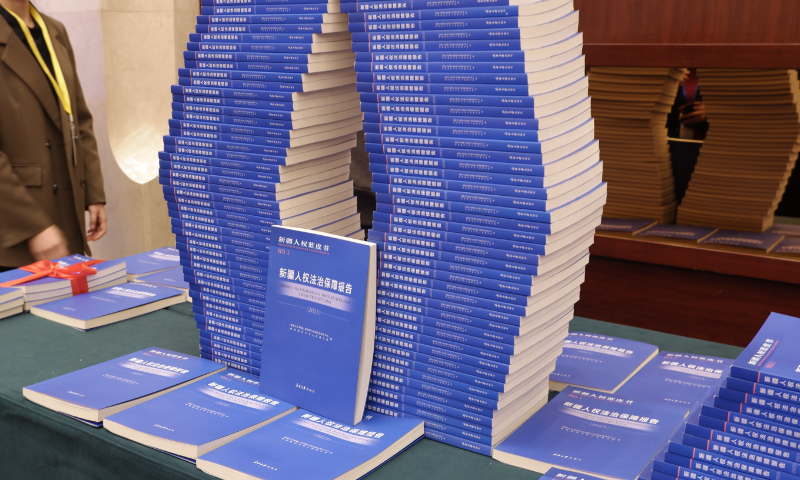China releases first blue book on Xinjiang's human rights and legal protections

China released the 2023 Report on Xinjiang's Human Rights and Legal Protections, which is Xinjiang's first blue book of its kind, on Wednesday in Urumqi, Northwest China's Xinjiang Uygur Autonomous Region, comprehensively demonstrating the efforts and achievements of promoting high-quality development of human rights cause in Xinjiang in Chinese modernization drive.
The newly released blue book is the first book led by scholars that examines Xinjiang's human rights and legal protections as well as future directions of the people in Xinjiang from an academic perspective, which is groundbreaking, Chang Jian, director of the Human Rights Research Center at Nankai University, told the Global Times on Wednesday at the 2023 Idea and Story Sharing Conference: Promoting High-Quality Development of Human Rights Cause in Xinjiang in Chinese Modernization Drive, where the blue book was published.
Erkin Tuniyaz, chairman of the people's government of Xinjiang region, revealed at the event that currently the overall social situation in Xinjiang remains stable, and there have been no incidents of violent terrorism for nearly seven years. The public's sense of security has reached an unprecedented level. In the eyes of tourists, Xinjiang has become "a place with the best public security management, the safest social environment and the most secure stability." The number of tourists to Xinjiang has increased from 48.6 million in 2012 to 260 million this year, reaching a historic high.
Over the past decade, Xinjiang's GDP has increased from 0.84 trillion yuan ($0.12 trillion) in 2013 to 1.77 trillion yuan in 2022, doubling in size. Per capita disposable income has increased from 13,700 yuan in 2013 to 27,000 yuan in 2022, with an average annual growth rate of over 8 percent. Many economic indicators have outperformed the national average, and the people of all ethnic groups are richer with more development opportunities.
For many years, more than 70 percent of the local fiscal expenditure has been used to guarantee and improve people's livelihoods. The average life expectancy has increased from over 30 years at the establishment of the autonomous region to 75.65 years today, according to a senior official.
The official added that Xinjiang attaches great importance to the excavation, inheritance, and protection of the excellent traditional cultures of all ethnic groups. For example, Uygur Muqam art, Uygur Meshrep and the Kirgiz epic Manas have been included in the UNESCO Representative List of the Intangible Cultural Heritage of Humanity. The promotion and standardized use of the national common language has been vigorously promoted in Xinjiang, and the languages and scripts of all ethnic groups have been widely used in education, judiciary, administration and social public affairs.
According to Erkin, in recent years, Xinjiang has actively expanded the ways for people of all ethnic groups to acquire religious knowledge and translated and published religious scriptures in multiple languages. Xinjiang has built a new campus for Islamic theological colleges and established eight branch campuses in Ili, Hotan, Kashi, and other areas, cultivating a group of high-quality Islamic talents. In particular, for religious activity venues such as mosques, Taoist temples, and Buddhist temples that have been in disrepair for a long time, Xinjiang has effectively improved their conditions by respecting the wishes of religious believers. This has been achieved through new construction, renovation, and expansion, ensuring the unhindered continuation of regular religious activities.
Practice has shown that the development of human rights in Xinjiang is in line with China's national conditions and the reality of Xinjiang, meeting the expectations of people of all ethnic groups, as well as the basic spirit of the Universal Declaration of Human Rights, Erkin said.
However, some countries turn a blind eye to the increasingly prominent human rights issues in their own countries, and wear colored glasses to criticize the human rights situation in Xinjiang, using human rights issues to interfere in China's domestic affairs, Erkin noted.
The people of all ethnic groups in Xinjiang are the ones who know best whether the path of human rights in Xinjiang is right or not. The people of all ethnic groups in Xinjiang have the most say in whether the human rights situation in Xinjiang is good or not, the regional senior official remarked.
Chang stated that some countries in the international community have weaponized human rights issues to strategically contain China, desperately smearing China's human rights situation. Xinjiang, as a focus of attention, has been falsely portrayed as a region with "forced labor," despite the fact that cotton harvests are good, mechanization levels are high, and efforts have been made to improve the employment rights of the people.
In this context, we have proactively released the blue book to show the outside world and help them understand, how the people of all ethnic groups in Xinjiang live, showing them experiences of individuals and personal stories. This can clarify the facts and enable the international community to see the true situation of human rights protection in Xinjiang, Chang stressed.
About 200 experts and scholars in the field of human rights from universities and research institutions inside and outside Xinjiang, media journalists, representatives of relevant departments and people sharing their personal stories attended the event on Wednesday.
By sharing touching stories and personal experiences, 10 representatives from various industries and fields in Xinjiang truly demonstrated the development and progress of Xinjiang's human rights cause.